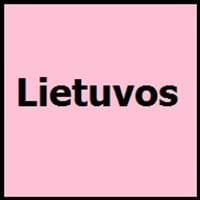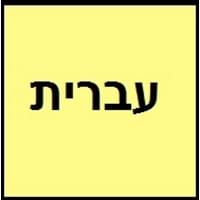Lithuanian vs Hebrew
Countries
European Union, Lithuania
Israel
National Language
Lithuania
Israel
Second Language
Not spoken in any of the countries
Israel
Speaking Continents
Europe
Africa, Asia, Europe
Minority Language
Poland
Poland
Regulated By
Commission of the Lithuanian Language
Academy of the Hebrew Language
Interesting Facts
- Lithuanian has many loanwords that originate from Slavic, Germanic and other Baltic languages.
- "Catheciusmus" is the oldest known book in Lithuanian language in 1547.
- The original language of Bible is Hebrew.
- The men and women use different verbs in hebrew language.
Similar To
Latvian
Arabic and Aramaic languages
Derived From
Not Available
Aramaic Language
Alphabets in
Lithuanian-Alpahbets.jpg#200
Hebrew-Alphabets.jpg#200
Writing Direction
Left-To-Right, Horizontal
Right-To-Left, Horizontal
Hello
Sveiki
שלום (Shalom)
Thank You
Ačiū
תודה (Toda)
How Are You?
Kaip sekasi?
מה שלומך? (ma shlomxa)
Good Night
Labanakt
לילה טוב (Laila tov)
Good Evening
Labas vakaras
ערב טוב (Erev tov)
Good Afternoon
Laba diena
אחר צהריים טובים (Achar tzahara'im tovim)
Good Morning
Labas rytas
בוקר טוב (Boker tov)
Please
Prašom
בבקשה (bevekshah)
Sorry
atsiprašau
סליחה! (Slicha)
Bye
Ate
להתראות (Lehitraot)
I Love You
Aš myliu tave
אני אוהבת אותך (Ani ohevet otcha)
Excuse Me
Atsiprašau
בבקשה!
Dialect 1
Samogitian
Ashkenazi Hebrew
Where They Speak
Lithuania
Israel
How Many People Speak
Not Available
Dialect 2
Aukštaitian
Samaritan Hebrew
Where They Speak
Lithuania
Israel, Palestine
Dialect 3
Curonian
Yemenite Hebrew
Where They Speak
Lithuania
Israel
Speaking Population
Not Available
Not Available
Second Language Speakers
Not Available
Native Name
lietuvių kalba
עברית / עִבְרִית (ivrit)
Alternative Names
Lietuvi, Lietuviskai, Litauische, Litewski, Litovskiy
Israeli, Ivrit
French Name
lituanien
hébreu
German Name
Litauisch
Hebräisch
Pronunciation
Not Available
[(ʔ)ivˈʁit] - [(ʔ)ivˈɾit]
Ethnicity
Lithuanians
Not Available
Language Family
Indo-European Family
Afro-Asiatic Family
Subgroup
Not Available
Semitic
Early Forms
No early forms
Biblical Hebrew, Mishnaic Hebrew, Medieval Hebrew, Hebrew
Standard Forms
Lithuanian
Modern Hebrew
Language Position
Not Available
Signed Forms
Lithuanian Sign Language
Signed Hebrew
Scope
Individual
Individual
ISO 639 6
Not Available
Not Available
Glottocode
lith1251
hebr1246
Linguasphere
54-AAA-a
12-AAB-a
Language Type
Living
Living
Language Linguistic Typology
Not Available
Subject-Verb-Object, Verb-Subject-Object
Language Morphological Typology
Synthetic
Fusional, Synthetic
Lithuanian and Hebrew Language History
Comparison of Lithuanian vs Hebrew language history gives us differences between origin of Lithuanian and Hebrew language. History of Lithuanian language states that this language originated in c. 1503 whereas history of Hebrew language states that this language originated in 1000 BC. Family of the language also forms a part of history of that language. More on language families of these languages can be found out on Lithuanian and Hebrew Language History.
Lithuanian and Hebrew Greetings
People around the world use different languages to interact with each other. Even if we cannot communicate fluently in any language, it will always be beneficial to know about some of the common greetings or phrases from that language. This is where Lithuanian and Hebrew greetings helps you to understand basic phrases in Lithuanian and Hebrew language. Lithuanian word for "Hello" is Sveiki or Hebrew word for "Thank You" is תודה (Toda). Find more of such common Lithuanian Greetings and Hebrew Greetings. These greetings will help you to be more confident when conversing with natives that speak these languages.
Lithuanian vs Hebrew Difficulty
The Lithuanian vs Hebrew difficulty level basically depends on the number of Lithuanian Alphabets and Hebrew Alphabets. Also the number of vowels and consonants in the language plays an important role in deciding the difficulty level of that language. The important points to be considered when we compare Lithuanian and Hebrew are the origin, speaking countries, language family, different greetings, speaking population of these languages. Want to know in Lithuanian and Hebrew, which language is harder to learn? Time required to learn Lithuanian is 44 weeks while to learn Hebrew time required is 44 weeks.





